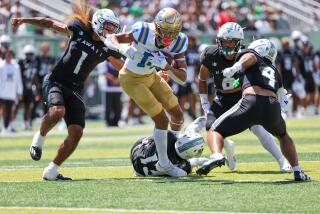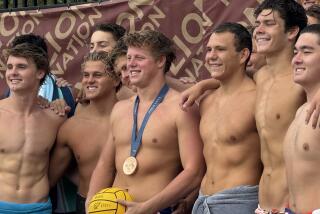From the archives: ‘Robo Dad’ Marinovich: He raises ‘trophy kids’
- Share via
Technically, the plaques and trophies in Marv Marinovich’s office belong to his son Todd, a rising star quarterback at USC. But they are a shrine to the father as well.
After all, it was Marv who knew which vitamin supplements he and his wife should take to conceive a perfectly healthy child. It was Marv who applied Eastern Bloc training techniques, insisting that Todd discipline his mind and body and forgo Big Macs, sugar and hanging out at the beach.
It was Marv who caught flak from in-laws critical of punishments such as forcing the 9-year-old Todd to run alongside the car from Huntington Beach to Newport Beach after the boy had not played his best in a basketball game. Sportswriters call his son “Robo QB” and “the first test-tube athlete.”
Of all fathers honored on Father’s Day, few have focused their lives so single-mindedly on being a dad--and with such mixed reviews.
Some parents who pay him to train their children at the fitness center he manages in the basement of the Anaheim Hilton and Towers see Marinovich as a model of how to help children succeed in an increasingly complex, competitive world.
Parenting authorities say his methods signal an abhorrent and dangerous trend among upper- and middle-class parents: over-programming their children and depriving them of childhood.
Child-rearing experts say “hot housing,” or the forced maturing of young children, has become a frightening national trend in academic and social life as well as sports.
Sue Bredekamp, director of professional development for the Washington-based National Assn. for the Education of Young Children, compared the phenomenon to “trophy wife,” a beautiful wife chosen for her image. “They’re trophy kids,” she said.
Meanwhile, Marinovich, 50, struggles with the knowledge that Todd is slipping beyond his daily control. Now divorced and remarried, he is starting over.
His second son, Mikhail, 2, has jogged two miles with his father and performs push-ups for admiring audiences at the gym.
Mikhail’s mother, Jan, is a 6-foot dance instructor. Todd’s mother, Trudi, came from an accomplished athletic family. Marinovich won’t say that the potential for athlete-producing genes is the first quality he has sought in a prospective mother. But it is “one factor.”
Less skilled than Todd, Mikhail has “speed, determination and fast-twitch muscle fiber,” says his father. “He’s muscular--real lean for a baby. He has exceptional bone structure and symmetry. The main thing is his temperament. He’s real aggressive.”
The toddler ranks in the 99th percentile in his age group for weight and height. If he wants to be an architect, journalist or dancer, Marinovich claims, that’s fine. “I’ll get into it, start reading and get well-versed.”
But Marinovich says that even at this tender age, Mikhail looks like a linebacker. Coaches are already asking about the boy, he said.
Marinovich traces his aggressive fathering to a day in his childhood when he asked his father whether he thought Marv would become a successful athlete. His father offered only an unsatisfying, “Oh sure. You’ll be great.”
Marinovich, who became captain of the USC Trojans football team and was an Oakland Raiders lineman, said: “In the years after that, I thought, ‘If I’m in that situation, I’ll help.’ I’ll say, ‘This is what you have to do.’ And not just, ‘Work hard, run and lift weights,’ but how much, the intensity and how many days.”
His children never needed to ask for his involvement. Their training began with leg stretches when they first came home from the hospital. Their back yard was filled with exercise equipment and blocking bags. Marinovich said he spent as much time coaching his firstborn daughter, Traci, as he did Todd. “But you could tell it was not what she wanted. It was more a recreational situation for her.”
Despite being quoted repeatedly as saying, “How well could a kid develop if you provided him with the perfect environment?” Marinovich denied that he and his first wife, Trudi, deliberately had set out to produce an athlete.
“We set out to produce a healthy, balanced child,” he said.
They started “with the mom taking balanced vitamin supplements and minerals before she was pregnant,” Marinovich said.
Their children never ate commercial baby food. Todd teethed on frozen raw kidney chunks for their vitamins and minerals. Refined sugar, animal fats, nitrites, coloring agents and white cake flour were not permitted to be eaten--even at other children’s birthday parties.
To develop Todd’s coordination, his father had him throw, catch and brush his teeth with his left and right hands. His mother saw to it that he visited museums and played the violin.
In high school, Marinovich called in specialists to teach Todd how to visualize plays, improve his peripheral vision and quicken his reaction time. In one exercise, he bounced a ball wearing distortion glasses while he solved math problems out loud. He worked out every day, including Christmas and Sundays.
Marinovich said he has no regrets for once making his son run eight miles beside his car after a lackadaisical performance on the basketball court. Todd cried when he finally arrived home and saw his mother.
“The guy was loafing,” Marinovich said. “I said, ‘I don’t care if you score every time, but I want you to hustle.’ He was doggin’ it.”
As early as grammar school, Marinovich had Todd change schools to take advantage of better coaching. Todd became a national sensation at Mater Dei High School in Santa Ana, where he led the football team as a freshman. Todd’s parents divorced when he was a sophomore in high school.
Todd moved again, leaving his girlfriend, and transferred to Capistrano Valley because Marinovich reportedly sought out a coach whose blocking strategies better protected the boy. At that school, Todd completed passes for more yards than any other high school player in the country.
At USC, where he earned a full scholarship, he was selected first team All Pac-10 quarterback.
Seated in his office at the fitness center last week, Marinovich explained that he developed his plan for Todd based on the Soviet model.
“Over there, they start young. They select the athletes on abilities, attitude and body structure and let them do as many varied activities as possible. That creates a base. Later on, the coach decides where the athlete should specialize.”
Last year, his dad moved from Mission Viejo to Torrance, partly because he could be closer to Todd. This summer, Todd is living with his mother in Newport Beach and working at least four hours a day with his father at the center.
From his office, Marinovich looked through glass walls at 6-foot-5, 208-pound Todd, starting the first day of his summer training. Todd goes through the list of exercises, poking his head in now and then to ask the name of a new exercise or when he should take a break.
Marinovich tells him to stop and give yet another interview on their relationship. Todd, well-trained on how to speak to the news media, considers the day his father made him run home. He laughs. “Then, I hated it. But I don’t resent it now.”
Asked if he loves his father, he responds quickly and unequivocally: Yes. Todd knows he’s loved in return. “Certain times, he doesn’t even have to say it.”
Marinovich’s fathering has been criticized almost from the beginning. “I think it bothered people that I would set out to create a super athlete and the guy would be very good and accomplish things. I think it irritated people. That it was almost the robotics kind of situation. Kind of un-American. Not the way we do it in this country. We don’t manufacture athletes,” he said.
His first wife and in-laws also thought he went too far. More than once, Trudi ran away with Todd to remove him from the pressure. Her mother, Virginia Fertig of Newport Beach, said she once asked Marinovich why he insisted that Todd work out every weekend.
“He said, ‘I’m going to raise him to earn a college scholarship.’ I said, ‘Why don’t you get a good job and then you can afford to send him to college?’ ”
But now that Todd wants a professional athletics career, she believes, “You have to give Marv his due. This is an age where you have to concentrate on what you’re doing, or else you won’t be successful.”
Others agree.
“All kids need to be pushed,” said Stan Castleton, general partner of the Anaheim Hotel Partnership, whose son David, 12, trains with Marinovich. “If Todd were a virtuoso violinist, Marv wouldn’t have received the criticism over the years for pushing and supporting him.”
Vernon and Jewell Vedder put their son Justin, 14, in a private school last year where he attended only two hours a day, two days a week, so he could train five days a week with Marv.
“We realized more and more these days kids have to start to train earlier,” Jewell said. “Justin has more training than a lot of kids going into college.”
Bredekamp, of the association for children, cautioned against too much structure in a child’s upbringing.
“When we were kids, we spent hours outdoors just playing, just free-form making up play. Now, if it’s not all programmed, structured and scripted, they’re at a loss. The long-term implications of that are scary.”
But all agree that in an age of absent and neglectful parents, it is better to have a pushy father than one who isn’t involved.
“There’s a real father hunger out there,” said James A. Levine, director of the Fatherhood Project at The Work and Families Institute in New York City. “Lots of kids in America are in single-parent families who grow up literally not ever seeing their fathers.”
Todd has been away from home three years and Marinovich says he is still in shock. During the school year, he goes at least once a week to watch Todd practice. “I’d like to go more,” he said.
During the time they do spend together, they discuss training.
The way Marinovich finds out Todd’s views on how he was reared is by reading printed interviews.
“I heard him make this statement: He’ll do the same thing. That says it all, I think.”
Marinovich spends time now with Mikhail, named after Mikhail Baryshnikov.
Like Todd, he will eat no commercial baby food, spend no time sitting passively in a stroller.
This time around, in addition to the health food diet and stretching exercises, Marinovich has begun a spinning exercise, borrowed from physical therapy for brain-damaged people.
“With Todd, I wanted to see what he could accomplish. It was something I wanted to brag about. It doesn’t mean as much to me now.”
The only mistake Marinovich said he won’t repeat is expecting consistent excellence.
Otherwise, “I’ll probably do basically the same plan.”
More to Read
Go beyond the scoreboard
Get the latest on L.A.'s teams in the daily Sports Report newsletter.
You may occasionally receive promotional content from the Los Angeles Times.










